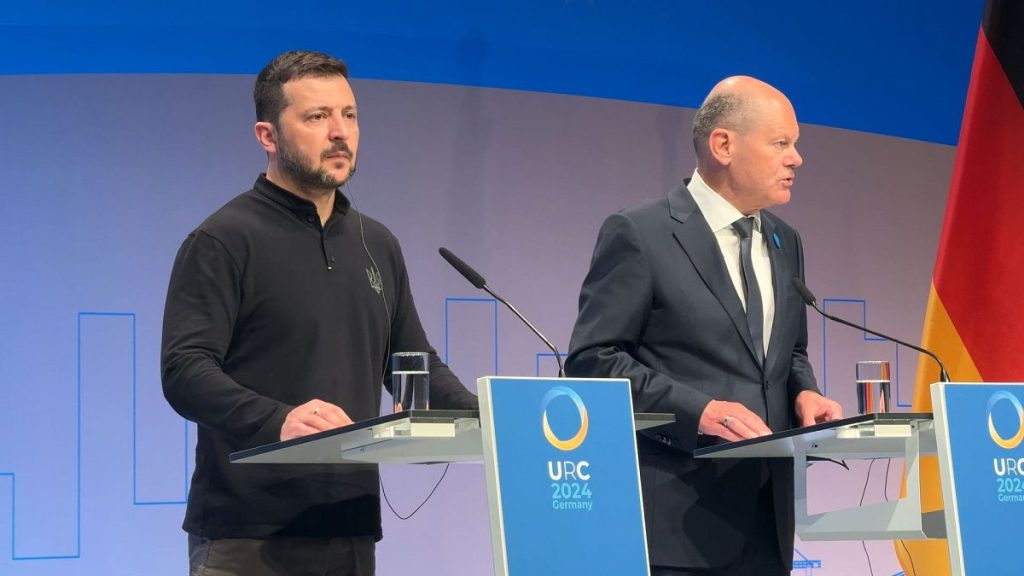German Chancellor Olaf Scholz recently promised to focus on renewable energy and hydrogen potential as Ukrainian President Volodymyr Zelenskyy visited Berlin. During the meeting, Germany and the EU pledged to assist Ukraine in repairing and rebuilding its energy infrastructure, which has suffered significant damage due to Russian attacks. Zelenskyy revealed that Ukraine has lost half of its electricity generating capacity, with 9 gigawatts destroyed in missile and drone attacks, while the energy consumption last winter was around 18 gigawatts. Scholz emphasized the importance of focusing on renewable energy and hydrogen potential, with a goal of rebuilding Ukraine as a future member state of the EU.
In addition to the support from Germany, EU Chief Ursula Von der Leyen pledged €1.9 billion in aid for Kyiv, with some of the funding coming from interest generated from frozen Russian assets. This financial assistance will be crucial in helping Ukraine recover from the energy infrastructure damage caused by Russian attacks. Zelenskyy also had the opportunity to speak in the German Bundestag for the first time during his visit to Berlin. Notably, politicians from Alternative for Germany (AfD) and the Sahra Wagenknecht alliance were absent from the session, as both parties oppose weapons deliveries in Ukraine.
The focus on renewable energy and hydrogen potential in Ukraine is seen as a key aspect of rebuilding the country’s energy infrastructure and securing its energy independence. By prioritizing these sustainable energy sources, Germany and the EU aim to help Ukraine transition towards a more resilient and environmentally friendly energy system. Scholz’s commitment to supporting Ukraine in rebuilding its energy sector reflects a broader effort to strengthen ties between the two countries and further integrate Ukraine into the EU.
The financial aid pledged by the EU will be instrumental in helping Ukraine recover from the extensive damage inflicted on its energy infrastructure by Russian attacks. With half of its electricity generating capacity lost, Ukraine faces significant challenges in meeting its energy needs and ensuring a stable power supply for its citizens. The funding from the EU, along with Germany’s commitment to renewable energy and hydrogen potential, will play a crucial role in rebuilding Ukraine’s energy sector and enhancing its energy security.
Zelenskyy’s address to the German Bundestag marked an important moment in diplomatic relations between Ukraine and Germany. By speaking directly to members of the Bundestag, Zelenskyy highlighted the urgent need for support from European allies in the face of Russian aggression. The absence of certain political parties from the session underscores the political divisions within Germany regarding support for Ukraine, with some calling for an end to weapons deliveries in the region. Despite these challenges, the commitments made by Scholz, Von der Leyen, and other European leaders demonstrate a united front in supporting Ukraine and helping it recover from the devastating effects of the conflict.
Overall, the promises of financial aid, support for renewable energy, and solidarity expressed by Germany and the EU during Zelenskyy’s visit to Berlin signal a renewed commitment to assisting Ukraine in rebuilding its energy infrastructure and overcoming the challenges it faces. By prioritizing sustainable energy sources and providing much-needed financial assistance, Germany and the EU are taking important steps towards helping Ukraine recover from the damage inflicted by Russian attacks and strengthening its energy security in the long term. The collaboration between Ukraine, Germany, and the EU reflects a shared commitment to supporting Ukraine’s future as a potential member state of the EU and securing its independence in the face of ongoing geopolitical challenges.


